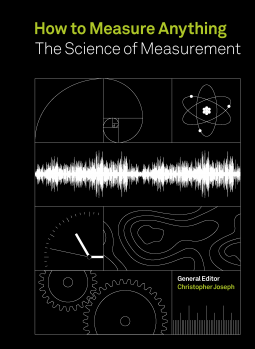
How to Measure Anything
The Science of Measurement
by Christopher Joseph
This title was previously available on NetGalley and is now archived.
Send NetGalley books directly to your Kindle or Kindle app
1
To read on a Kindle or Kindle app, please add kindle@netgalley.com as an approved email address to receive files in your Amazon account. Click here for step-by-step instructions.
2
Also find your Kindle email address within your Amazon account, and enter it here.
Pub Date Apr 12 2022 | Archive Date May 17 2022
Quarto Publishing Group – Ivy Press | Ivy Press
Talking about this book? Use #HowtoMeasureAnything #NetGalley. More hashtag tips!
Description
Measurement is constantly all around us. It forms the foundations of science — the ohms and amps of physics and the moles and isotopes of chemistry — and shapes our every day.
Our relationships with measurement start the moment we wake and check the day’s temperature and continue until the precise second we go to sleep. But beyond the familiar measurements, hundreds more are listed in this entertaining and revealing reference book.
Packed with unusual and fascinating facts ranging from everyday amounts, such as how much salt is there in a pinch (1/8 teaspoon), to key scientific measurements, including the parsec, which is equivalent to 3.26 light-years, or just over 19.26 trillion miles, How to Measure Anything’s entries are accompanied by diagrams, symbols, and illustrations to help demonstrate these concepts and measurements in action.
The methods used to measure food, photography, finance, commerce, magnetism, and atomic physics are just a fraction of the areas covered in this essential guide that helps us to better understand how our world works.
Available Editions
| EDITION | Other Format |
| ISBN | 9780711268036 |
| PRICE | $26.00 (USD) |
| PAGES | 224 |
Featured Reviews
 John L, Reviewer
John L, Reviewer
High-brow littlest room browsing, here, as the person who wants to be edified while on the toilet can flick through a nice few terms and definitions that may or may not have anything to do with their job or interests. Here then is the saros, a period during which the eclipse pattern we see from Earth resets and starts over. Here is global confusion when we learn the chain, if spoken of on Cyprus, is nothing like 22 yards, as it's eight inches (or clearly two hands). Here then is the semi-trivial fact that the Plimsoll line may have six marks, for all the different seasons and kinds of water the ship is floating in.
Make no mistake, this is not a yearbook, or almanac or anything, even though it has the stylish high-quality look of a book that does come out in a fixed standard over the years (Schott's, Worst Case, Haynes etc). It won't tell you any current demographic data – but it will make sure you know what demography covers as a term. It gathers everything in subjects, and ignores alphabetical order, so things such as all the different flow rate units are together. It is dry and academic, and quite scientific, and all this proves it to be a potential reference book for those people who don't trust the Internet for such things, or as I say something for the esteemed brain to dip into and out of. Proof-reading for a book downloaded a week before launch was very lax, so I hope had been completed to make this what it should be – a four star if niche volume.



